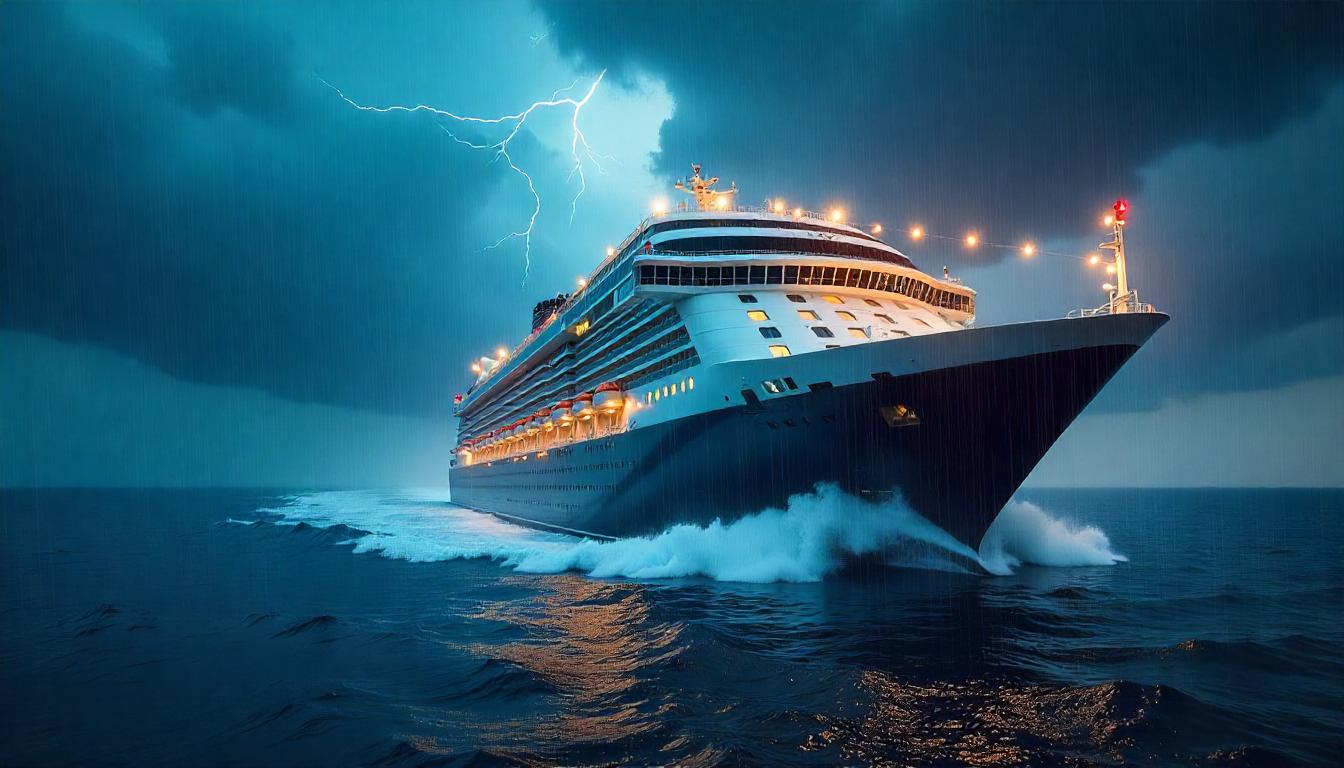Sunday, May 4, 2025
A recent surge in violent incidents involving passengers on major U.S.-based cruise lines — including Carnival, Royal Caribbean, and Virgin Voyages — has alarmed travelers and triggered urgent calls for reform. As assaults and altercations continue to disrupt voyages and compromise onboard safety, cruisers are demanding a unified “Do Not Sail” blacklist to prevent offenders from simply booking with another cruise line. The absence of cross-brand data sharing has exposed a critical loophole, prompting widespread concern across the cruise industry and among U.S. passengers.
Passengers and safety advocates argue that the current system, where each cruise line independently manages its “Do Not Sail” list, falls short in protecting guests. The rising concern stems from recent events that have drawn widespread attention and criticism, especially within U.S. ports.
Advertisement
Carnival Brawl in Galveston Sparks Policy Enforcement
Advertisement
On April 26, a massive fight broke out at the Port of Galveston in Texas as guests disembarked Carnival Jubilee. Carnival Cruise Line immediately responded by adding 24 individuals involved in the altercation to its Do Not Sail list, effectively banning them from all future cruises with the company. Carnival emphasized its zero-tolerance stance toward physical violence and pledged to maintain a secure environment onboard.
This incident underscored growing safety challenges in U.S.-based cruise terminals and raised questions about whether individuals barred from one cruise line could easily sail with another.
Violence Erupts in Elevator on Royal Caribbean’s Liberty of the Seas as Passenger Assaults Fellow Cruiser
In a separate April incident aboard Royal Caribbean’s Liberty of the Seas, authorities arrested an 18-year-old passenger after a violent assault in one of the ship’s elevators. The victim suffered serious injuries, and law enforcement charged the assailant with a felony. The case intensified concerns among guests about the effectiveness of cruise security and highlighted the potential dangers in common areas where surveillance may be limited.
Virgin Voyages Incident Raises Alarm at Sea
Just days earlier, a passenger aboard a Virgin Voyages ship physically assaulted another guest in a bar, reportedly choking and threatening to kill them. Security intervened quickly, but the dramatic nature of the incident — including the location in a nightlife setting — ignited further fears over safety, especially among passengers traveling alone or with children.
These back-to-back violent episodes on U.S.-linked cruises exposed a clear vulnerability in the current system, leading travelers to question whether cruise companies share vital safety data with each other.
Cruisers Push for a Unified Industry Blacklist
Across online platforms, including Reddit, concerned passengers began to raise calls for a shared “Do Not Sail” list across all major cruise operators. One cruiser questioned whether guests banned from Royal Caribbean could simply book a trip on Carnival or Disney instead, without consequences.
Many supported the idea that cruise lines should create a collaborative ban system — especially for passengers involved in:
- Assault and battery
- Sexual harassment
- Dangerous or reckless behavior
- Repeated violations of safety protocols
One post suggested that cruise lines such as Carnival, Royal Caribbean, Disney, and MSC should exchange data on guests guilty of serious misconduct. This would prevent known offenders from simply hopping between brands after being banned by one.
Do Cruise Lines Share Ban Lists?
Cruise lines generally maintain individual passenger watchlists, but no industry-wide system exists for sharing this data. However, some cruise companies may enforce bans within their corporate families.
For example:
- If Royal Caribbean bans a passenger, that person may also be prevented from boarding ships operated by Celebrity Cruises and Silversea, which fall under Royal Caribbean Group.
- Carnival Corporation, which owns Carnival Cruise Line, Princess Cruises, Holland America Line, and Costa Cruises, may extend bans across those brands. This decision typically depends on the severity of the offense and is handled internally.
But since Virgin Voyages operates independently, and most cruise lines do not share databases, passengers banned on one ship can easily board another from the same U.S. port unless law enforcement intervenes or a public record flags them.
Cruise Companies Screen Passengers, But Gaps Remain
Cruise operators reserve the right to deny boarding to passengers with serious criminal convictions, including those involving violence or sexual misconduct. For instance, Carnival Cruise Line clearly outlines its ability to refuse entry to individuals with records of:
- Aggravated assault
- Sexual offenses
- Armed robbery
- Other violent or immoral crimes
To enforce this, cruise lines may use public criminal databases and background checks. However, they primarily rely on pre-boarding screening, and without interline cooperation, they risk allowing banned passengers to reappear under new bookings.
Families and Solo Travelers Voice Safety Concerns
With the rise in onboard violence, U.S. cruise passengers — particularly parents and solo travelers — have started to express hesitation about shipboard freedom.
One Royal Caribbean cruiser posted concerns about letting their teenage children walk unsupervised. They argued that cruise security should more actively monitor high-risk passengers and that behavior patterns, such as group aggression or intoxication, should trigger immediate intervention.
This sentiment echoes across family travel forums, where users share stories and safety tips while pressing cruise lines for clearer enforcement and preventive action.
Why a Shared “Do Not Sail” List Matters
A universal blacklist would allow cruise lines to:
- Identify and deny known violent passengers regardless of which brand they book with
- Share behavior history between security departments
- Flag offenders before boarding, reducing the risk of onboard altercations
- Reassure passengers that safety is an industry-wide priority
Cruisers see this as a necessary evolution in an era when thousands of passengers from around the world embark on U.S.-based sailings every week. Without collaboration, dangerous individuals can continue to travel unchecked.
Could Federal Regulation Be the Answer?
Some passengers believe that federal authorities or port regulators should require cruise lines operating from U.S. ports to comply with standardized safety protocols. This could include:
- Mandated behavior databases
- Criminal background checks
- Standard rules for reciprocal bans across all operators
- Public reporting on cruise-related violent incidents
At present, the U.S. government does not require cruise lines to maintain or share passenger ban lists. Nor is there a federal system to track passenger behavior across different brands. However, if violent incidents persist, lawmakers may eventually introduce legislation addressing this gap.
Cruise Brands Risk Reputation Damage
Passenger safety isn’t the only issue at stake. Ongoing incidents threaten the public image of cruise brands that pride themselves on hospitality, security, and family entertainment.
When violence occurs onboard and videos circulate across social media, cruise lines face brand backlash, potential lawsuits, and lost bookings. The industry must now weigh the cost of non-cooperation against the long-term damage to public trust.
A unified safety initiative — including a shared blacklist — could improve customer confidence and position participating cruise lines as leaders in passenger protection.
How U.S. Passengers Can Stay Safe at Sea
While the cruise industry works toward stronger safety measures, travelers can follow key precautions to safeguard themselves on board:
- Review cruise line security policies before booking
- Research recent incidents involving specific ships or operators
- Establish communication routines with family members while onboard
- Report unusual behavior immediately to ship personnel
- Stay alert in crowded areas like bars, elevators, and pool decks
Passengers should also know their rights and expectations regarding cruise line responses to onboard violence.
A string of violent incidents aboard Carnival, Royal Caribbean, and Virgin Voyages in the U.S. has raised serious safety concerns, prompting cruisers to demand a unified “Do Not Sail” blacklist to block repeat offenders across all cruise lines. Passengers argue that without industry-wide bans, dangerous individuals can exploit gaps between cruise brands.
Cruise Lines Face a Crossroads
As Carnival, Royal Caribbean, and Virgin Voyages face scrutiny for recent violent incidents tied to U.S. sailings, pressure is mounting to introduce a coordinated response. Passengers now call for a shared “Do Not Sail” blacklist that transcends brand borders and ensures offenders can’t simply switch lines after being banned.
Whether the industry takes this step voluntarily or through regulation remains to be seen. But one fact is clear: In the wake of growing violence, cruise operators must prioritize passenger safety or risk losing public confidence altogether.
Advertisement
Advertisement
Tags: Carnival, cruise news, royal caribbean, travel industry, Travel News, US, virgin voyage
I want to receive travel news and trade event update from Travel And Tour World. I have read Travel And Tour World’sPrivacy Notice.
Friday, June 6, 2025
Thursday, June 5, 2025
Friday, June 6, 2025
Friday, June 6, 2025
Thursday, June 5, 2025
Thursday, June 5, 2025
Friday, June 6, 2025
Friday, June 6, 2025




